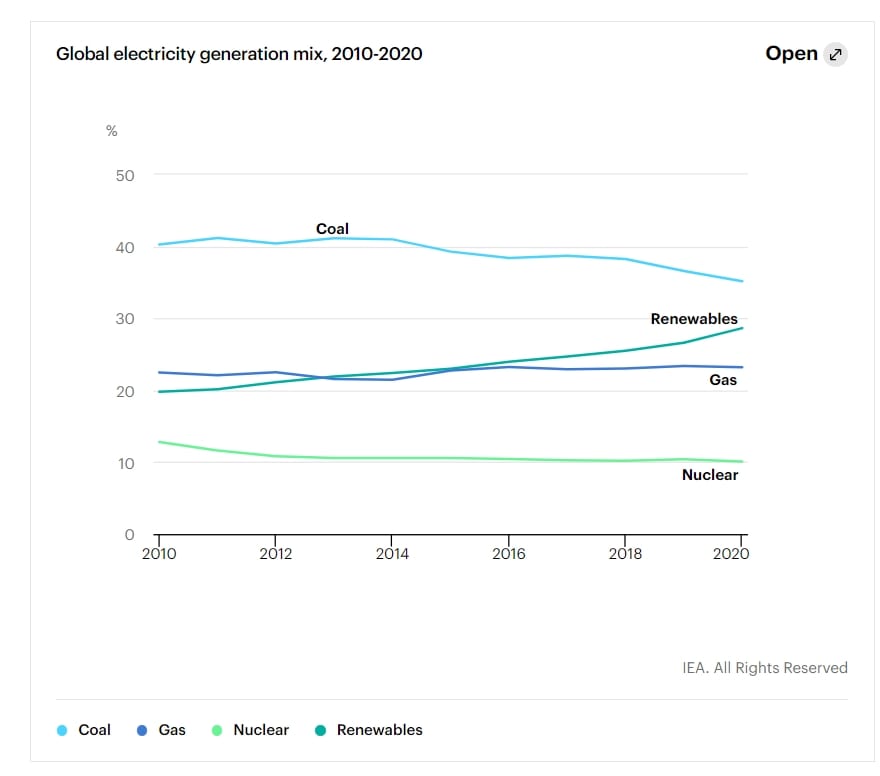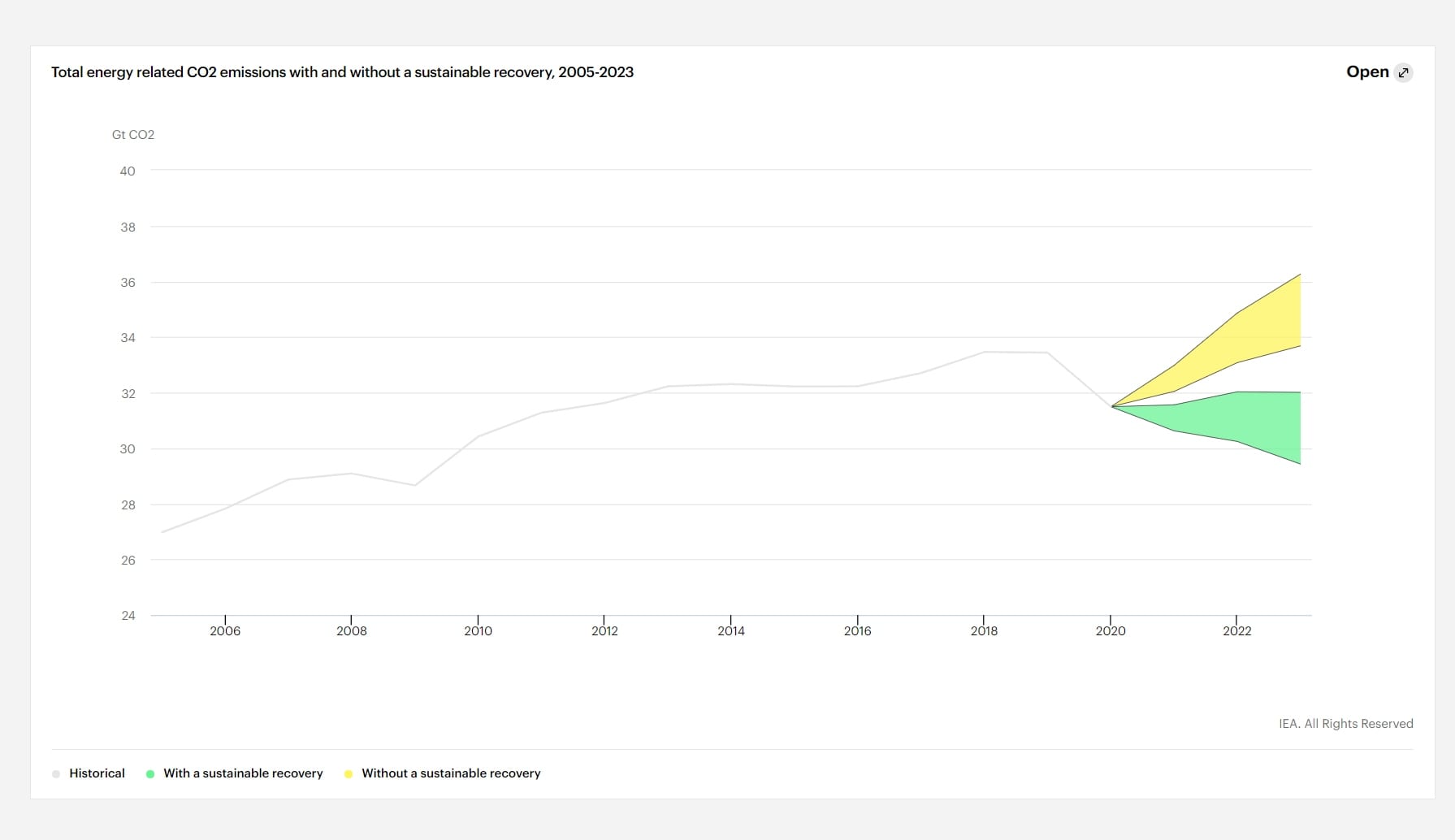A new report from the International Energy Agency (IEA) shows that global emissions have sprung back in December 2020, 2% higher than December 2019, due to an economic recovery and an absence of strong clean energy policies around the world.
Covid19 hit the world’s high-emissions sectors in early 2020, resulting in a total decline of about 6% in global emissions over the course of the full year. But across different regions, and across the time span of the year, there has been significant variation. Emissions in China, for instance, increased 0.8% (or about 75 MTCO2-e) over the year. Emissions in India surpassed 2019 levels from September 2020. US emissions fell by 10% over the year, but began to bounce back in the latter half of the year.
This, combined with new data from Australia’s emissions inventory showing a ‘bounce back’, sets the scene for potential failures to seize on the transformational potential of this major shift in global energy.
Global emissions fell by almost 2 billion tonnes in 2020, the largest absolute decline in history. Most of this was due to lower use of oil for road transport & aviation.
As travel & economic activities pick up around the world, oil consumption & its emissions are rising again. pic.twitter.com/Mo91BuyB2P
— Fatih Birol (@fbirol) March 2, 2021
“If current expectations for a global economic rebound this year are confirmed – and in the absence of major policy changes in the world’s largest economies – global emissions are likely to increase in 2021,” Said Dr Faith Birol, head of the IEA. “Nonetheless, there are still reasons for optimism. China has set an ambitious carbon-neutrality target; the new US administration has rejoined the Paris Agreement and is putting climate at the heart of its policy-making; the European Union is pushing ahead with its Green Deal and sustainable recovery plans; India’s stunning success with renewables could transform its energy future; and the United Kingdom is building global momentum toward stronger climate action at COP26 in November”.
The IEA’s data show that in 2020, renewable energy came close to providing 30% of the world’s electricity generation for the first time, and will likely surpass this in 2021. Coal has fallen from around 40% in the early 2010s to 35%, but must fall faster if the world aligns to ambitious climate goals.
The IEA’s report also found that renewable energy has done the majority of the heavy lifting in reducing power sector emissions over the 2010s, with coal-to-gas switching and nuclear comprising a minority of emissions reductions every year. Both 2019 and 2020 saw net reductions in greenhouse gas emissions from the world’s power sectors due mostly to renewable energy, though many years in the past decade saw emissions reductions cancelled out by rising electricity demand.
 “In the power sector, CO2 emissions declined by 3.3% (or 450 Mt) in 2020, the largest relative and absolute fall on record,” wrote the IEA. “While the pandemic reduced electricity demand last year, the accelerating expansion of power generation from renewables was the biggest contributor to lower emissions from the sector. The share of renewables in global electricity generation rose from 27% in 2019 to 29% in 2020, the biggest annual increase on record”.
“In the power sector, CO2 emissions declined by 3.3% (or 450 Mt) in 2020, the largest relative and absolute fall on record,” wrote the IEA. “While the pandemic reduced electricity demand last year, the accelerating expansion of power generation from renewables was the biggest contributor to lower emissions from the sector. The share of renewables in global electricity generation rose from 27% in 2019 to 29% in 2020, the biggest annual increase on record”.
The report notes that, on average, avoided emissions from renewable energy grows by around 10% each year, with that value expanding to a 50% increase in 2020 relative to 2019.
However, maintaining these trends will be difficult. Though 2020 saw the largest absolute decline in CO2 emissions in history, the IEA warns 2021 and beyond will be pivotal years for the future trajectory of emissions. The organisations highlights the need for far greater investment in clean energy and green stimulus package, if the world is to avoid rising emissions in the coming years.
“Many power systems successfully kept the lights on, allowing hospitals to function or communication systems to operate with much higher shares of variable renewables,” wrote the IEA. “This provides a glimpse of things to come and offers greater confidence in operating large electricity systems powered with higher shares of renewables. Further, consumer preference for electric vehicles continues to grow, as does the number of electric vehicle models available”.
In November this year, the COP26 global climate conference will draw attention to country level climate policies and post-COVID stimulus decisions, with Australia likely to face heavy criticism for not updating its climate targets and investing heavily in fossil fuels to recovery economically from COVID19.












